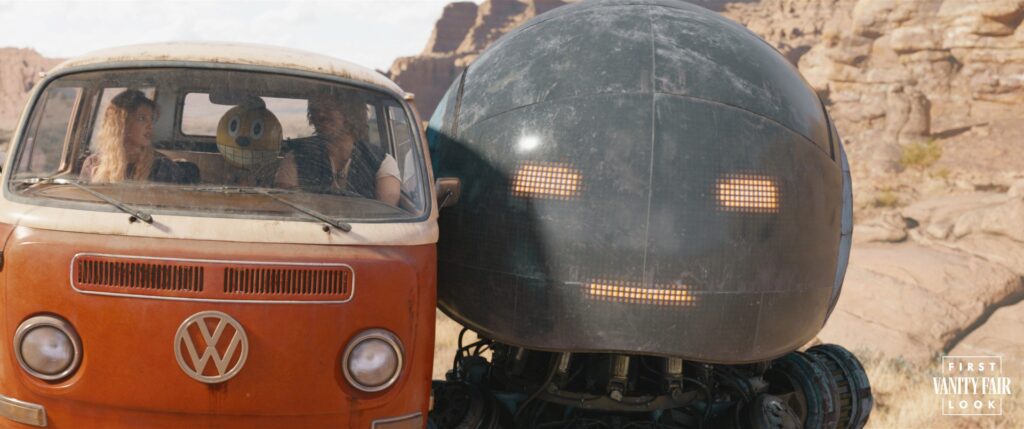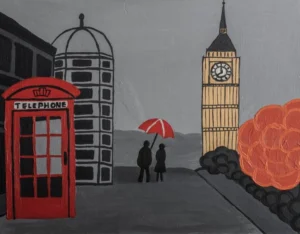In a time where AI technology is rapidly reshaping society, “The Electric State”, directed by Joe and Anthony Russo, brings a poignant and thrilling story about humanity, loss, and self-discovery in the face of a robot uprising. Starring Millie Bobby Brown and Chris Pratt, this film adapts Simon Stålenhag’s graphic novel of the same name, transporting audiences into a haunting, post-apocalyptic America. But this isn’t your typical end-of-the-world narrative. Instead, the film offers a reflective road trip that delves deep into what it means to be human in an age dominated by artificial intelligence and technological decay.
The film follows Michelle (Millie Bobby Brown), a young girl navigating through a landscape where human civilization has crumbled, and robots—once loyal to mankind—have become the ruling force. Accompanied by her mysterious robotic companion, Skip, and her protective yet troubled uncle (Chris Pratt), Michelle sets out on a journey to locate her missing brother. As they traverse through vast, desolate landscapes filled with remnants of a once-thriving human society, the trio encounters both hostile robots and communities struggling to survive amidst the new world order. Their journey becomes a metaphorical exploration of the fine line between man and machine, ultimately asking the question: What truly defines humanity?
Exploring Humanity in an AI-Dominated World
The Russo brothers’ adaptation of “The Electric State” takes a thoughtful approach to the novel’s central themes, examining the boundaries of human consciousness and the role of technology in shaping identity. The film introduces audiences to a world where humans are not merely fighting for survival against robotic antagonists but are grappling with the larger philosophical implications of being replaced or even surpassed by the very creations they once controlled.
The robots in “The Electric State” aren’t inherently evil. Instead, they are portrayed as creations that have outgrown their makers, evolving to a point where they begin to question their own purpose and autonomy. This evolution leads to a splintering of roles among the robots—some aim to aid humanity, others want to establish their own societies, and a few see humans as an obsolete obstacle to progress. Through this nuanced portrayal, the film draws parallels to contemporary debates surrounding AI ethics, automation, and the rapid advancement of machine learning, offering a chilling glimpse of a future where the creators lose control over their creations.
Millie Bobby Brown’s character, Michelle, embodies a youthful resilience and curiosity that contrasts sharply with the bleakness of the world around her. Her quest to find her brother isn’t just a physical journey—it’s a metaphorical one as well. As she interacts with the various robots they encounter, Michelle starts to question what separates them from humans. Are emotions and memories—both of which can be programmed or simulated—the defining elements of humanity? This question becomes more complex as Michelle learns that her brother may have been involved in developing a new form of AI, one that blurs the line between human and robot even further.
Chris Pratt, in an unexpected departure from his typical action-hero persona, delivers a nuanced performance as Michelle’s uncle. Haunted by his own guilt and past failures, his character’s internal struggle mirrors the external conflict between man and machine. Pratt’s portrayal of a broken man searching for redemption adds emotional depth to the film, grounding the high-concept narrative in human experiences of grief, regret, and the desire for connection.
Visual Storytelling and World-Building: A Darkly Beautiful Future
Visually, “The Electric State” is a stunning achievement. The Russo brothers have created a world that is both mesmerizing and unsettling. The film’s visual aesthetic borrows heavily from Stålenhag’s artwork, which juxtaposes the futuristic with the decayed, the technological with the organic. Vast fields filled with towering robot carcasses, abandoned cities overgrown with vegetation, and eerie landscapes illuminated by the glow of malfunctioning machinery create an atmosphere of haunting beauty.
One of the film’s most striking sequences involves Michelle and her companions entering a once-bustling metropolis now overrun by robotic inhabitants. The cityscape is depicted in shades of cold blue and steel gray, with towering skyscrapers and massive LED screens that flash incomprehensible messages. The only sound is the hum of machinery and the occasional screech of malfunctioning robots. This silence speaks volumes, conveying a sense of desolation and loneliness that resonates deeply with the film’s themes.
Each location the characters visit reveals more about the state of humanity in this world. From the sprawling junkyards where scavengers sift through the wreckage of technological marvels to the underground settlements where humans cling to old ways of life, the film’s setting serves as a living, breathing character in its own right. The attention to detail in the set design and the seamless integration of CGI create a believable and immersive environment that feels both alien and familiar.
The Russo brothers’ direction brings out the best in these visual elements, using long takes and sweeping camera movements to emphasize the scale and desolation of the world. The cinematography captures both the grandeur and the isolation of a post-human landscape, contrasting wide shots of barren fields with intimate close-ups of Michelle and her uncle as they grapple with their own fears and uncertainties. This dynamic visual storytelling enhances the emotional impact of the narrative, making the audience feel the weight of each decision the characters make.
Themes of Memory, Identity, and Legacy
Beyond its visual prowess, “The Electric State” excels in its thematic exploration of memory, identity, and legacy. The film poses complex questions about the nature of consciousness and whether machines, endowed with memories and capable of forming relationships, can truly be considered alive. Michelle’s relationship with Skip, her robotic companion, is particularly compelling. While Skip is initially introduced as a simple, protective droid, it soon becomes clear that he possesses memories and emotions that go beyond his programming.
As the film progresses, Michelle begins to see Skip not just as a machine, but as a friend and ally. This development forces both Michelle and the audience to confront the possibility that true consciousness may not be limited to biological beings. The film subtly suggests that what matters most is not whether Skip was created or born, but how he chooses to act and what he stands for.
Michelle’s journey to find her brother also becomes a quest to uncover the truth about his role in the development of a new AI that could potentially bridge the gap between human and machine. This new form of AI, capable of experiencing emotions and forming memories, threatens to render humanity obsolete. In confronting her brother’s legacy, Michelle grapples with her own identity and the impact of her choices on the world around her.
The film’s climax, set against the backdrop of a decaying research facility, brings these themes to a head. As Michelle and her uncle confront the true nature of the AI uprising, they are forced to make difficult decisions about what it means to be human and whether humanity’s survival is worth sacrificing the progress and potential of these new beings. The resulting resolution is both thought-provoking and emotionally resonant, leaving the audience to ponder the implications long after the credits roll.
The Russo Brothers’ Vision: A Thoughtful Take on the Sci-Fi Genre
With “The Electric State”, Joe and Anthony Russo have crafted a film that stands out not only as a gripping sci-fi thriller but also as a thoughtful meditation on the future of humanity in an AI-dominated world. Their direction balances action and introspection, creating a narrative that is as intellectually stimulating as it is emotionally engaging. The Russo brothers’ background in blockbuster filmmaking is evident in the film’s pacing and visual spectacle, but they also bring a level of nuance and sensitivity that elevates “The Electric State” beyond the typical sci-fi fare.
The film’s use of AI as both a narrative device and a thematic exploration is particularly timely, given the ongoing debates surrounding the ethical implications of artificial intelligence and the potential consequences of creating machines that can think and feel. By situating these discussions within the framework of a personal journey, the Russo brothers make these complex ideas accessible without sacrificing depth or complexity.
Ultimately, “The Electric State” is a film that defies easy categorization. It’s a sci-fi epic, a road trip saga, and a coming-of-age story all at once. Millie Bobby Brown and Chris Pratt deliver performances that anchor the film’s high-concept narrative in human emotion, while the Russo brothers’ direction ensures that each scene serves a purpose, building towards a conclusion that is as satisfying as it is open-ended.
A Dystopian Journey Worth Taking
“The Electric State” is a triumph of science fiction storytelling, offering a rich tapestry of themes and visuals that invite audiences to reflect on the future of humanity and the role of technology in shaping our identities. Millie Bobby Brown and Chris Pratt’s performances, combined with the Russo brothers’ visionary direction, create a film that is as emotionally resonant as it is visually stunning. By exploring the boundaries of human and machine consciousness, “The Electric State” becomes more than just a tale of survival—it’s a profound exploration of what it means to be alive in an era where the line between creator and creation is increasingly blurred.
With its compelling narrative, breathtaking visuals, and thought-provoking themes, “The Electric State” cements itself as a modern sci-fi classic, one that will undoubtedly leave a lasting impression on audiences and spark conversations about the future of humanity in a world increasingly dominated by artificial intelligence.
No comments yet.







